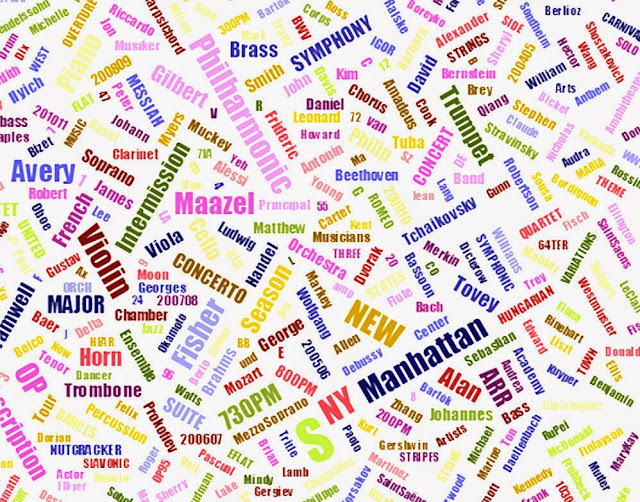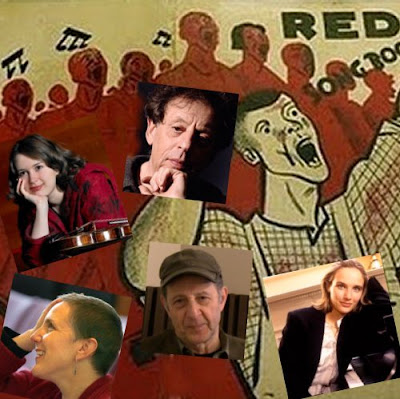In dulci jubilo in Cambridge
The Fairhaven Singers were formed twenty years ago, and give around five concerts a year in Cambridge college chapels and the West Road Concert Hall. They have fifty voices, and sing repertoire ranging from the Renaissance and Baroque to twentieth century music, and from a cappella to working with full orchestral accompaniment. It is groups like this, as well as the well known college choirs, that make Cambridge the world centre of choral music. I have written about this outstanding choral tradition in previous posts including Monteverdi in Cambridge and Masses of early music in summertime Cambridge.
Regular readers will know that Francisco Guerrero and Olivier Messiaen rank high among my musical gods. With four centuries separating them they do not often appear on the same programme, yet alone as a performing sequence
What was so striking about the Fairhaven Singers was their energy, their expertise, but above all their sheer enjoyment of music making under the direction of Ralph Woodward. He was an Organ Scholar at Queen's College, Cambridge, and is now Musical Director of the Britten-Pears Chamber Choir and something of an authority on the music of Britten. This young musician is deservedly going places, watch out for him.
A special mention for Ralph Woodward's thoughtfully planned programme (and excellent notes). Here is the programme in full with some useful links:
Gloria sei dir gesungen - J.S. Bach (1685-1750), sung from ante-chapel.
On Jordan's bank - words by C. Coffin, music from Musikalisches Handbuch of 1690, processional hymn.
Ave Virgo sanctissima - Francisco Guerrero (1528-1599).
Les enfants de Dieu - Olivier Messiaen (1908-1992), organ solo by John Cotterill.
The blessed Son of God - Ralph Vaughan Williams (1872-1958).
Unto us is born a Son - words, traditional G.R. Woodward, music from Piae Cantiones, 1582, arranged by Sir David Willcocks, congregational hymn.
Anthem for Christmas Day - Maurice Greene (1695/6-1755). This edition was edited by Ralph Woodward, and this was probably its first performance in modern times.
While sheperds watched - words by Nahum Tate (1652-1715), music from Este's Psalter of 1592, congregational hymn.
In dulci jubilo - Anon.
Marche des Rois mages - Théodore Dubois (1837-1924), organ solo by John Cotterill (any organists among my readers who do not know this work search it out - you are missing a lot of fun)
A boy was born - Will Todd (b. 1970)
Good King Wenceslas - words by J.M. Neale, music from Piae cantiones of 1582, arranged by Reginald Jacques, congregational hymn.
Vox Dicentis - Edward Naylor (18677-1934)
O come, all ye faithful - words, traditional F. Oakley, music English 18th century arranged by Sir David Willcocks
Hosanna to the Son of David - Orlando Gibbons
This programme is being repeated on Sunday 18th December at 8.00pm in the Church of Our Lady and the English Martyrs in Cambridge. Tickets are £12.50 including mince pies and mulled wine, and all proceeds go to the charity CAMFED International which is dedicated to fighting poverty and AIDS in rural communities in Africa by educating girls.
The Fairhaven Singers are performing an all Mozart programme on 27th January 2006 in the West Road Concert Hall, Cambridge, including his Requiem with Emma Kirkby and other soloists plus the Brandenburg Sinfonia. More details from the choir's web site.
Report broken links, missing images and other errors to - overgrownpath at hotmail dot co dot uk
Image credit:
Header - Jesus College chapel: nave ceiling (1846-1849, William Morris, painted by Frederick Leach) linked from Cambridge2000 which owns the copyright. This site has many interesting architectural photos of Cambridge.
Middle and Footer – Ralphwoodward.net
Image owners - if you do not want your picture used in this article please contact me and it will be removed. If bandwidth is a problem with your permission I will host your image.
If you enjoyed this post take An Overgrown Path to Officium live - a triumph of music theatre










Comments
It is very pleasing to receive comments like this. I know that my (endless?) posts about file downloads will always find an audience. But when writing pieces like In dulci jubilo I do sometimes think - How many people will read this all the way through, and follow the links?
I am delighted that readers are interested in 17th century playwrights like Nahum Tate as well as in 21st century iTunes files.
Now I am waiting to see how many readers land at this comment from Google as a result of having misspelt Art Tatum.
And that is not a joke. You should see how many good folk who do not have English as their first language arrive at my Great Britten article as result of having misspelt Great Britain in Google!
This is turning out to be a really popular article.
It has just been reblogged in Japanese at the wonderfully named
Trivial Tracks - but only open that link if you have a Japanese character set installed on your PC!
I'm really glad you enjoyed the performance so much. That makes it all the more worthwhile.